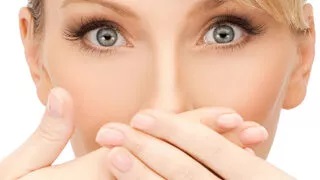Bad Breath (Halitosis) | How to get rid of bad breath
How to get rid of bad breath

Chronic bad breath is very likely to be caused by the digestive system.
Our patients who apply to the dentist with the complaint of bad breath are examined with an oral and dental examination; conditions such as caries, calculus, abscess, gingival diseases, fixed and removable prostheses, and chronic poor oral hygiene that may cause odour in the mouth are evaluated, and necessary treatments are recommended in the presence of one or more of these.
If bad breath persists after these treatments, our patient is referred to an ear, nose, and throat specialist to evaluate diseases such as sinusitis, tonsillitis, nasopharyngitis, and postnasal discharges.
An ENT specialist refers a patient to a gastroenterology specialist if they believe the odour extends beyond the immediate area. In other words, we seek a solution from the mouth, the beginning of the digestive system, all the way to the end.
What is halitosis?
Halitosis is the name given to the bad odour emanating from the oral cavity—that is, from the mouth—that is disturbing to the individual himself and the people around him.
Bad Breath Causes:Types of Bad Breath Smells
Type 1:
The source of type 1 bad breath is the oral cavity. Failure to clean under the bridges in the mouth, the presence of decayed teeth and gum disease, and the gases produced by bacteria that settle in the recesses on the tongue surface cause bad odour.
Type 2:
This type of bad breath not only originates from the mouth but also disrupts the person's environment. Type 2 halitosis is caused by sinusitis, tonsillitis, nasopharyngitis, and postnasal discharge.
Type 3:
Type 3 halitosis is caused by digestive enzymes or digestive organs. The gastro-oesophageal sphincter (the valve between the oesophagus and the stomach) can become swollen, gases can form when food isn't fully digested because of a lack of digestive enzymes, and people who eat too much milk and dairy every day can get reflux and gastritis.
Type 4:
The cause is of lung origin. It is defined as breath odour, not bad breath. An infection in the lung or lower respiratory tract can cause this odour. The odour is caused by the transformation of some gases in the blood into aromatic compounds during exhalation. The specific acetone odour seen in diabetic patients occurs this way. People with gout and those using birth control pills can also experience this odour.
Type 5:
Patients think that they have bad breath, but there is no measurable bad breath. It is psychogenic. Patients are usually introverted, emotional people. Instead of approaching type 5 halitosis patients with statements such as there is no smell in your mouth, the condition can be overcome with the cooperation of a psychiatrist.
How to treat bad breath
Do:
- Carefully wash your teeth and gums a minimum of twice daily for two minutes.
- Use a toothpaste containing fluoride.
- Consider using an antimicrobial mouthwash or toothpaste.
- Use interdental brushes or dental floss to clean between your teeth at least once daily.
- Delicately cleanse your tongue once day using a tongue scraper or cleanser.
- Maintain the cleanliness of dentures and remove them throughout the night.
- Use sugar-free mints or chewing gum subsequent to consuming pungent meals and beverages.
- Get routine dental examinations.
Dont's:
- Avoid rinsing your mouth with water immediately after brushing your teeth.
- Avoid excessive consumption of sugary meals and beverages.
- Avoid vigorous brushing, as it may cause bleeding of the gums or tongue.
- Refrain from smoking.
Frequently Asked Questions
- Oral hygiene should be carefully maintained..
- Teeth, gums and tongue should be brushed.
- Daily dental floss should be used.
- Alcohol-free mouthwashes should be used.
- Dental check-ups should be done at least twice a year.
Cigarette causes bad breath directly by disrupting the chemistry in the mouth or by causing tooth and gum diseases. Excessive smoking leads to hairy tongue. It causes food residues and tobacco odour to be retained on the hairy tongue for a longer period of time. This leads to an aggravation of halitosis.
If you experience halitosis, evaluate your oral hygiene practices. Consider implementing lifestyle modifications, including brushing your teeth and tongue post-consumption, using dental floss, and ensuring adequate hydration. If persistent halitosis continues despite modifications, consult your dentist.
It is normal to have bad breath in the morning after waking up. This bad breath improves during morning oral hygiene. However, persistent bad breath despite oral hygiene may indicate a tooth or gum problem or another health problem that is not related to the mouth.
If you feel that you have bad breath, lick the inside of your wrist and inhale the smell, just as the inside of the wrist is used in perfume scent tests; if the smell is unpleasant, your breath is likely to be similar. Another solution is to consult a close friend.
You can contact Pulpa Oral and Dental Health Polyclinic in Alanya, Antalya, Turkey for information about all kinds of dental treatments aftercare.
Reveal Your Smile
Pulpa Oral and Dental Health Polyclinic

